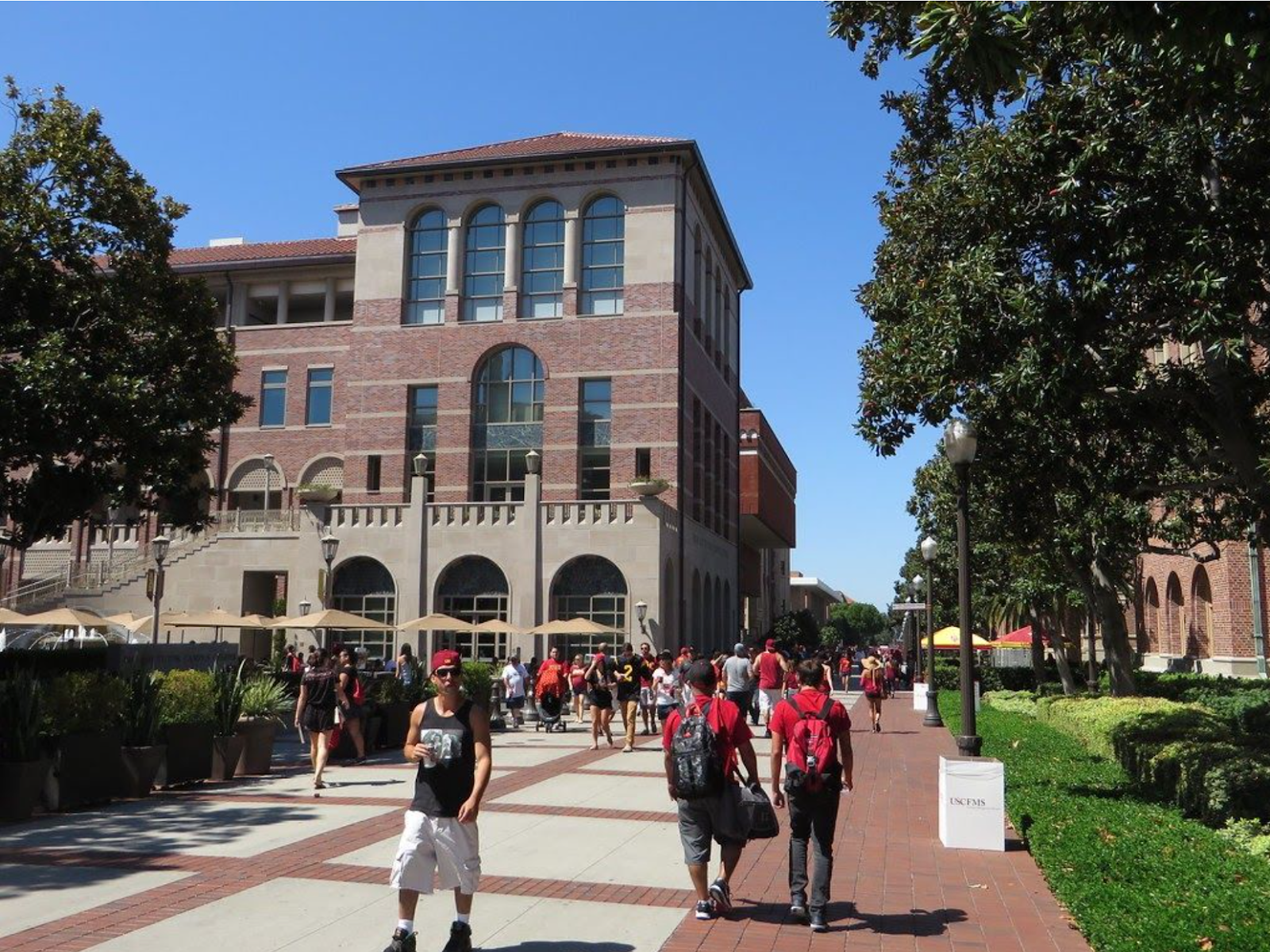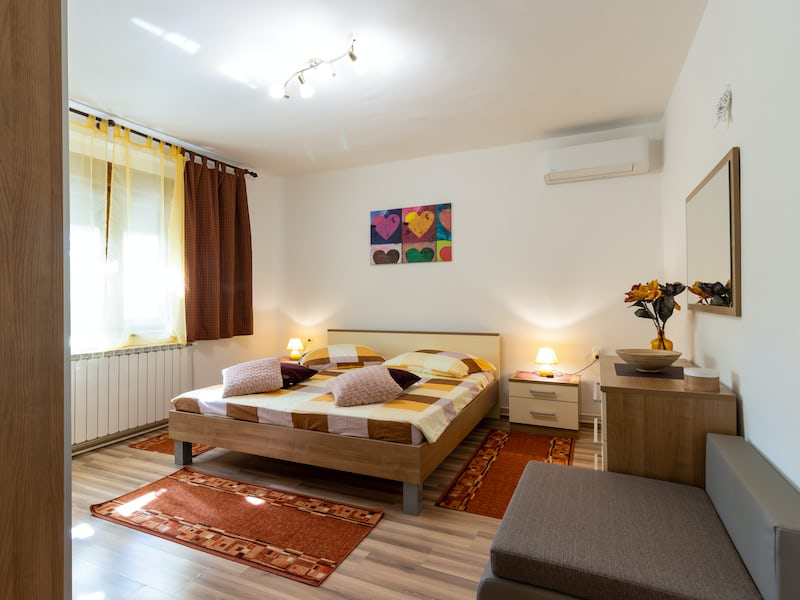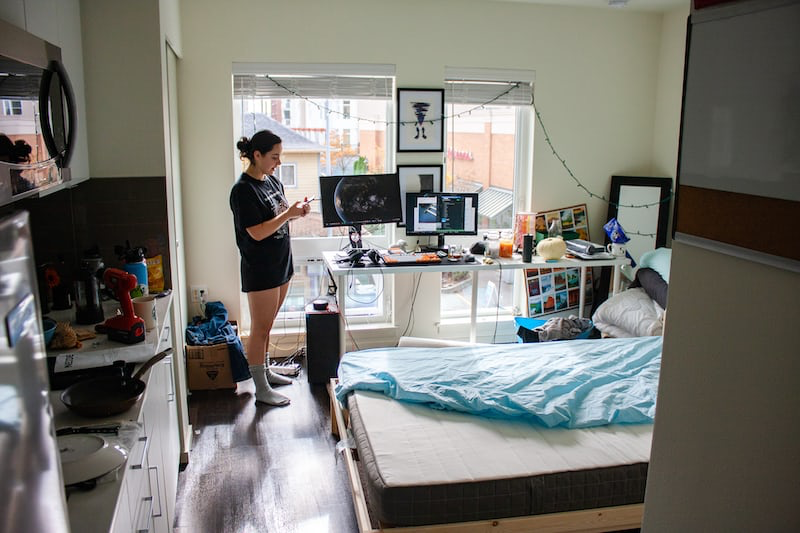Where are you moving to?
University of Southern California: Dorms vs Off Campus Apartments
Table of contents
- Why Choosing Between Off-Campus Housing and Dorms Matters
- Space Comparison: Dorm Rooms Vs Off Campus Apartments
- Which Offers the Better Feel of Community?
- Rules and Regulations: What Are My Obligations as a Dorm Resident vs Off-Campus Resident?
- Cost Comparison between Dorm Living and Off Campus Living
- Location: Which is More Convenient, Living On-Campus or Off?
- Privacy: Dorm Life VS. Off-Campus Living: Which Offers More Personal Space?
- What amenities will you find in an off-campus apartment?
- Flexibility: What Living Option Provides More Flexibility Regarding Lease Terms?
- Conclusions: USC Off-Campus Housing VS. Dorms
As far as costs are concerned, living at USC off-campus requires taking into consideration additional expenses beyond just rent such as utilities, internet connection costs and transportation fees.
On the flip side, living in a dorm often comes with a meal plan to offset some of the costs of campus living.
Why Choosing Between Off-Campus Housing and Dorms Matters
If you’re a student at the University of Southern California questioning whether you should live in the dorms or off campus, this will offer you comprehensive information that will help you make your decision. I’m a Trojan and have lived both in the dorms and off campus in Los Angeles CA.
For many USC students, finding proper accommodations near campus can be tricky. There are many pros and cons that come with on and off campus housing, so it can be hard to know which is best for you.
On-campus housing has the perks of being close to campus, however, off-campus housing provides more flexibility for students looking to have more independence and space.
First-year college students may benefit from living on-campus to ease into campus life quickly and be close to both classes and friends, however, as you move into later years the question of living on or off-campus becomes more prominent.
Many students say that living on campus during their first year helped them make friends since they are surrounded by other students. The dorms offer events and workshops that many students find helpful in not only meeting people but learning about campus life. Additionally, being close to campus is nice and reduces your commute to class.
Most of the dorms have one or two roommates in their room and the room itself is not very big. After a long day of classes, studying, and activities you might want to decompress and have some alone time, but your roommates will always be there.
Space Comparison: Dorm Rooms Vs Off Campus Apartments
USC Off-campus apartments provide more space than dorm rooms do compared to USC dorms which typically range between 100 to 200 square feet and can feel cramped and restrictive. Studio apartments typically range between 300-600 square feet while one-bedroom units can provide between 600 to 1,000 square feet of living space, giving more opportunity for creating individual living areas and making your space seem larger and more functional.
Dorm rooms tend to feel cramped if shared by multiple roommates with shared facilities such as bathrooms. However, Off-campus apartments generally feature separate bedrooms, living areas, kitchens and bathrooms - providing more room to relax and spread out. You may also benefit from extra storage space for belongings - perhaps access to amenities like balconies and patios!
Off-campus apartments provide more flexibility in size and layout options; from studio apartments to multi-bedroom units. You have more freedom to make the apartment your home. Off-campus living options often provide more spacious living environments that enable students to study, unwind and rest comfortably.
Overall, off-campus apartments may offer you more living and breathing room than dorm rooms.
Which Offers the Better Feel of Community?
Dorm living can offer an inimitable sense of community that's hard to replicate elsewhere. Being immersed among students going through similar experiences creates a powerful bond of friendship and shared identity that you won't find living in off-campus apartments.
Community is another crucial consideration. Living in a dorm will allow you to connect with fellow students experiencing similar circumstances; plus you'll have access to events and activities designed specifically for dorm residents that will allow you to form friendships while feeling like part of a community.
USC Off-campus housing also can bring with it an enhanced sense of community if you opt to live with roommates or in an apartment building with other students. You might gain access to shared areas, like lounges or study rooms where you can socialize and form bonds with the other residents of your building.
Living off-campus offers another kind of community: one that may be more diverse in terms of age, background and interests. You might need to put forth extra effort when building relationships with neighbors but this could result in meaningful bonds that continue beyond simply your time at school.
At the core, your choice between dorms and off-campus apartments may depend on personal priorities and preferences.
Rules and Regulations: What Are My Obligations as a Dorm Resident vs Off-Campus Resident?
Living in a dorm often imposes more stringent regulations and rules compared to living off campus, including noise restrictions and guest policies as well as alcohol/drug usage policies.
Off-campus apartments generally provide less restrictive living environments with fewer rules and regulations; this gives students more freedom to live life the way they see fit.
However, this also comes with more responsibility to ensure compliance with local noise levels, partying policies, and other aspects of living situations. Your preferences regarding dorm life versus independent off-campus living depend heavily on both personality and lifestyle considerations.
Cost Comparison between Dorm Living and Off Campus Living
There are various costs to take into account when making this comparison; rent is likely one of the major ones depending on where and what kind of housing unit is chosen by both students.
Off-campus apartments tend to be more costly than dorm rooms; however, they often provide more amenities and higher levels of comfort. Also note that off-campus housing requires paying utilities such as gas, electricity, and water bills which may add up quickly.
Rent: What Is the Average Rent for USC Off-Campus Housing?
The costs associated with off-campus housing near USC may depend upon both type and location; studio apartments could run anywhere between $1,500-$2,500 monthly rent depending on size; larger properties might cost even more per month.
Not surprisingly, however, prices will differ widely depending on a property's neighborhood, amenities and other variables.
Utility Cost: If I Live in USC Off-campus
As part of living off-campus, utilities costs should also be carefully evaluated when planning budgets. Utilities include electricity, gas, water and internet service costs among others.
Utility costs vary significantly based on factors like apartment size, usage patterns and local utility rates; on average, students living off campus near USC should expect to spend between $150 to $200 on utilities each month.
Are Meal Plans Included in the Cost of Dorm Living?
A major advantage to living in a dorm is that many colleges and universities provide meal plans as part of the overall cost of living expenses, offering convenient and cost-effective means of making sure students can access healthy, nutritional meals throughout their week.
However, it should be remembered that meal plans may not always be included with dorm living costs and could incur extra fees or restrictions depending on your school.
Transportation Costs for Off-Campus Residents?
Transportation should also be considered when comparing dorm living to off-campus living costs, with dorm residents often being able to walk or bike to campus and save on transportation costs by doing so.
However, if you live off-campus near USC and require transportation expenses such as gasoline or public transit costs as well as ridesharing services like Uber or Lyft for access, such as Uber/Lyft rides - on average students living off campus should budget an approximate sum between $100-150 in monthly transportation expenses.
Location: Which is More Convenient, Living On-Campus or Off?
Considerations related to location are of prime importance when making housing choices while attending USC, especially living on-campus as it means being close enough for walking commutes between classes and classes on other campuses if desired.
However, Off-campus living may also prove convenient depending on its location.
Proximity to Campus: How Close Will You Live Off-Campus, Instead of in a Dorm?
Living on campus means you are likely to be located close to classes and other campus events; however, off-campus living offers closeness as well; perhaps living near apartments or houses nearby could work.
Students attending USC often choose to live in nearby neighborhoods such as West Adams, University Park or Exposition Park which are easily accessible from campus.
Proximity to Other Amenities: What Amenities Can Be Found Near USC Off-Campus Housing?
When considering off-campus housing options near USC, amenities like grocery stores, restaurants and entertainment venues should always be top of mind. USC area offers several off-campus options that are within walking distance of such services for convenient living arrangements.
An example of such a housing option would include Polaris. Located just steps away from restaurants, coffee shops and grocery stores - which provide students living there an ideal living experience - living here provides them with everything they need for daily convenience.
Privacy: Dorm Life VS. Off-Campus Living: Which Offers More Personal Space?
Dormitory living at USC offers less privacy compared to living off campus. Off-campus living options such as apartments or houses tend to provide greater privacy for students who value having space of their own.
Roommates in a Dorm
Dorm rooms typically house one or more roommates and this can be both beneficial and challenging; while meeting people and creating relationships may be rewarding for some it could also require giving up personal space that might otherwise exist elsewhere in your dorm.
USC off-campus housing often means living alone in your bedroom or with one or two roommates in an apartment - which provides more privacy.
Bathroom Sharing in Dorms
As part of your privacy plan in a residence hall, bathroom-sharing arrangements must be kept in mind.
Off-campus housing options often feature either private bathrooms or shared ones that have smaller student populations to create a more pleasant living experience.
What amenities will you find in an off-campus apartment?
Off-campus accommodations often boast amenities not available in dorms. A complete kitchen allows students to save money by cooking instead of dining out each meal.
Some apartments feature their own washers and tumble dryers, eliminating the need to travel to a communal laundry. Apartments off campus may even offer pool or gym access that keeps you active while building relationships among neighbors.
Overall, all these features create an enhanced living environment.
Flexibility: What Living Option Provides More Flexibility Regarding Lease Terms?
Flexibility should also be kept in mind, and living off-campus offers you greater choice with regards to lease term choices - something dorms don't often allow, which could prove inconvenient if any unexpected events require your presence on campus at certain points during the year.
USC Off-campus housing tends to offer greater leasing flexibility than dorms due to being untethered from the academic calendar. Dorm leases usually last the duration of the school year - which typically is nine months long and generally span from August through May; thus committing students to living there until that point or face penalties and forfeit their security deposit if they decide to vacate early.
In contrast, off-campus housing often provides more flexible lease terms for students living there - including month-to-month leases as well as six and 12-month agreements - so they can better adjust to changing living needs, whether just one semester is desired or extended stays are required for internships or co-op programs.
Housing near USC also offers various lease lengths to fit individual student housing needs; including short-term options suitable for students needing housing for just a semester or few months.
Summer Housing Options at USC: Can You Stay on Campus This Summer?
Many universities, including USC, provide summer housing options to accommodate students during the academic summer break. Space may be limited so students should apply early if interested.
Summer housing may incur additional expenses that exceed what an off-campus apartment rental costs in terms of expenses for living costs and utilities.
Study Abroad: What Happens to Your USC Dorm Room When Study Abroading?
Students interested in studying abroad have various options regarding what should happen with their dorm room when going abroad - some universities allow them to keep it for the entirety of the program while others require that upon returning they find alternative housing arrangements for themselves and/or vacate it completely and find suitable alternatives as soon as they return from study abroad programs.
Students enrolled at USC who will be studying abroad for at least one semester may apply to be released from their dorm lease, which enables them to avoid paying rent on rooms they won't use while still exploring housing options when they return home.
Conclusions: USC Off-Campus Housing VS. Dorms
Decisions between dorm life and off-campus living depend on many different variables such as cost, location, space requirements and community involvement. Dorms offer convenience while off-campus living offers greater personal space, flexible lease terms and additional amenities.
Before making a decision on housing options at USC, it is crucial that all aspects are carefully considered. We hope that our article has provided useful insights that allow for informed choices to be made about housing arrangements.
Making a choice between USC off campus housing or dorms should ultimately depend on you as an individual, taking into consideration personal preferences and circumstances before reaching a decision. Carefully evaluate each factor when making this choice and do your research so that your living situation suits both your budget and needs.
Try these popular nearby searches
- Pet friendly homes for rent near USC
- Homes with Parking for rent near USC
- Homes with Private Bathroom for rent near USC
- Furnished homes for rent near USC
- Homes with EV Charging for rent near USC
- Homes with Washer/Dryer for rent near USC
- Homes with Utilities-Included for rent in USC
- Wheelchair Accessible homes for rent in USC
- Homes under $800 for rent near USC
- Homes under $900 for rent near USC
- Homes under $1000 for rent near USC
- Homes under $1200 for rent near USC
- Homes under $1400 for rent near USC
- Homes under $1500 for rent near USC
- Homes under $2000 for rent near USC
- Homes under $2500 for rent near USC
- Homes under $3000 for rent near USC
- Short Term for rent USC
- Open House for rent near USC
- Instant Move-in for rent near USC
- Special Offer for rent near USC
- Cheap homes for rent near USC
- Luxury Apartments for rent near USC
- Premier USC Home Rentals
- Best homes for Rent near USC
- 1 Bedroom homes for Rent Under $2,000 in USC
- Coliving Spaces near USC
- Homes in Dps for rent near USC
- USC Graduate Housing
- Homes with Shuttle Bus Service near USC
- Pet friendly homes for rent near USC
- Homes with Parking for rent near USC
- Homes with Private Bathroom for rent near USC
- Furnished homes for rent near USC
- Homes with EV Charging for rent near USC
- Homes with Washer/Dryer for rent near USC
- Homes with Utilities-Included for rent in USC
- Wheelchair Accessible homes for rent in USC
- Homes under $800 for rent near USC
- Homes under $900 for rent near USC
- Homes under $1000 for rent near USC
- Homes under $1200 for rent near USC
- Homes under $1400 for rent near USC
- Homes under $1500 for rent near USC
- Homes under $2000 for rent near USC
- Homes under $2500 for rent near USC
- Homes under $3000 for rent near USC






